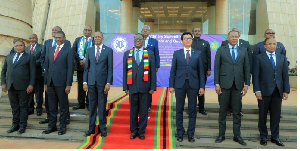The Peasant Farmers Association of Ghana (PFAG) has called on Parliament to summon the Minister of Food and Agriculture, Bryan Acheampong, to address several important matters concerning the second phase of the Planting for Food and Jobs (PFJ).
According to the association, there were serious questions about the transparency and accountability emanating from the current rollout of the programme that should be addressed.
During a press conference held in Accra on Thursday, the Executive Director of PFAG, Mr Bismark Owusu Nortey, identified significant challenges including political interference, lack of focus, and neglect of farmers’ interests as key obstacles.
He explained that the abysmal registration process of the programme, characterised by several challenges made it difficult and demotivating for farmers to register.
He said that there was lack of adequate extension officers to collect farmers’ data, inadequate logistics (tablets and motor bikes) to facilitate movement and the bad timing of the process.
He said as of July 2024, the independent assessment, which was also corroborated by figures from the various district departments of agriculture, showed that less than 15 per cent of the estimated farmer population had registered under the programme, which was very underwhelming.
In addition to the challenge, the Executive Director said was the current input distribution formula under the grant component of the PFJ 2.0, which had become extremely politicised and serving as an avenue for some “unscrupulous public officials and politicians to demand payments from farmers before benefitting.”
Mr Nortey advocated the total withdrawal of politicians from the process, emphasising the need for the district department of agriculture, aggregators, and other stakeholders in the value chain to fulfill their respective roles.
He also urged the government to promptly tackle the issues associated with the implementation of PFJ 2.0 for farmers.
In light of the recent drought affecting various regions of the country, he urged the government to initiate an emergency irrigation support programme aimed at supplying water to farmers in order to restore crops impacted by climate change, which has led to food shortages nationwide.
Reacting to the issues raised in an interview with the Ghanaian Times, the Public Relations Officer, of the ministry, Tanko Bagbara, refuted the claims and said participation in the registration of the PFJ 2.0 was transparent and not politically motivated.
He explained that, the ministry had recently, introduced a digital platform dubbed ‘Ghana Agriculture and Agribusiness Platform (GhAAP) which enabled farmers to register onto the PFJ 2.0.
However, he said the applicants were to meet specific requirements, including having access to land or a farm, be Ghanaian citizen with a valid Ghana card, engage in farming on prioritised commodity crops, and be a legally registered company or institution.
He said this development, which is self-registration regardless being an illiterate was monitored and supervised by Agricultural Extension Agents at the various districts.
He said the platform which had other modules such as the Inputs Dealers module and Aggregator modules among others allows the input dealers to know the inventory of agro-inputs available in real time and records requests from aggregators for agro-inputs as well as details about deliveries made to such aggregators.
On the grant component of the programme, he said it was designed to support vulnerable farmers with limited access to inputs. Additionally, the first 200,000 farmers fully registered on the GhAAP would receive these grants.
Click to view details



Business News of Monday, 19 August 2024
Source: ghanaiantimes.com.gh

















